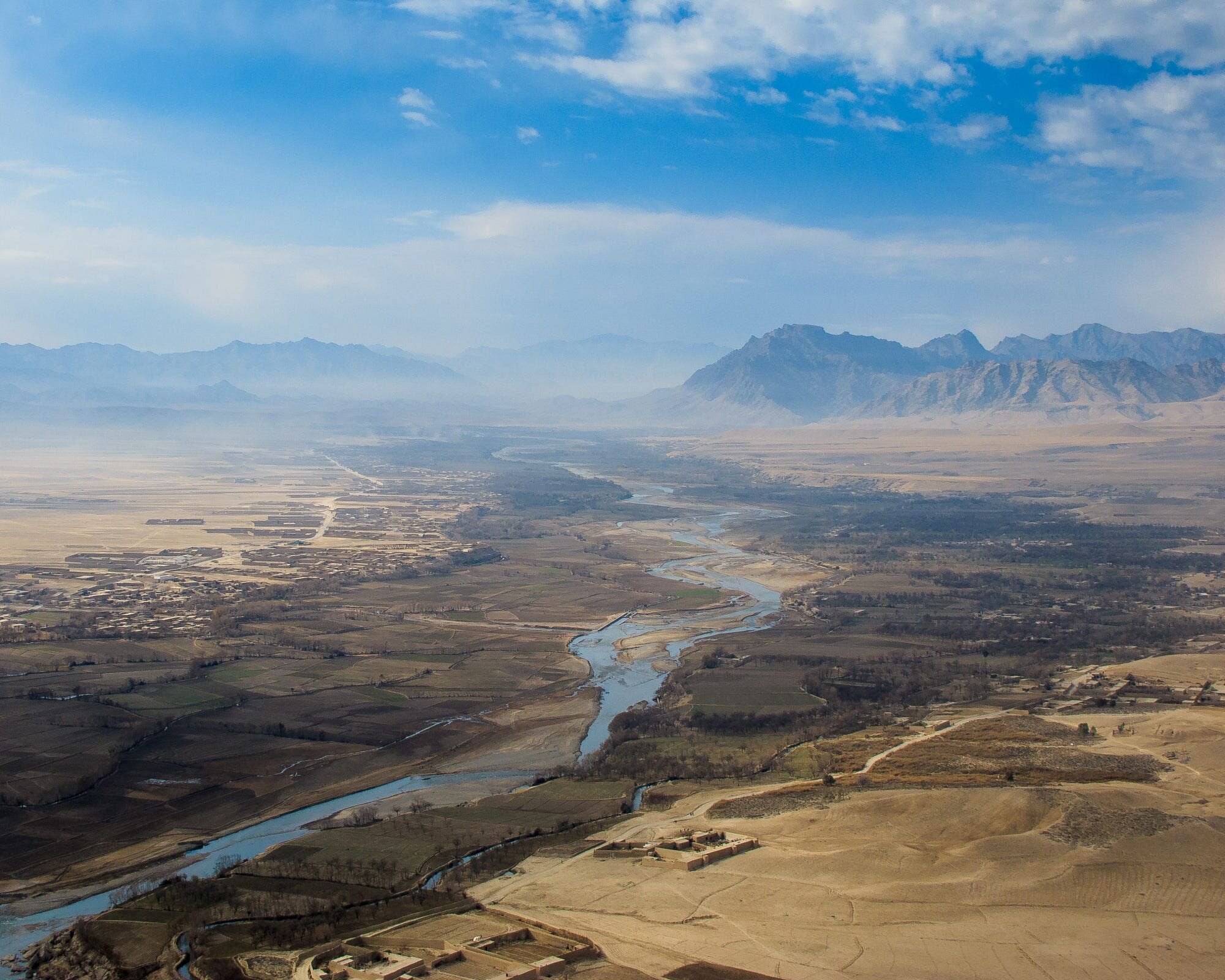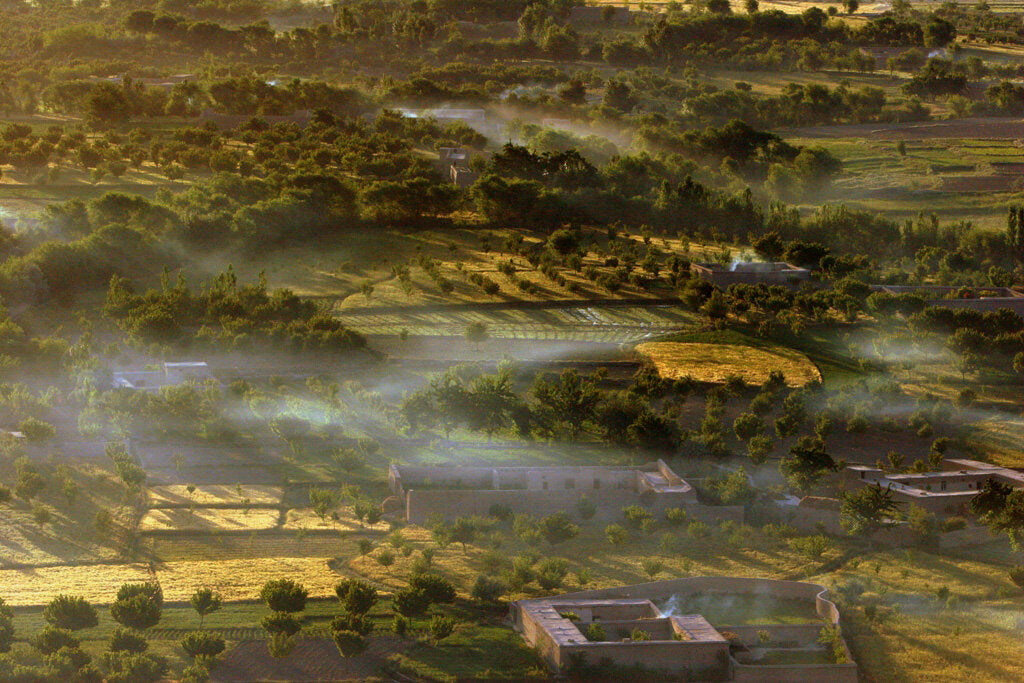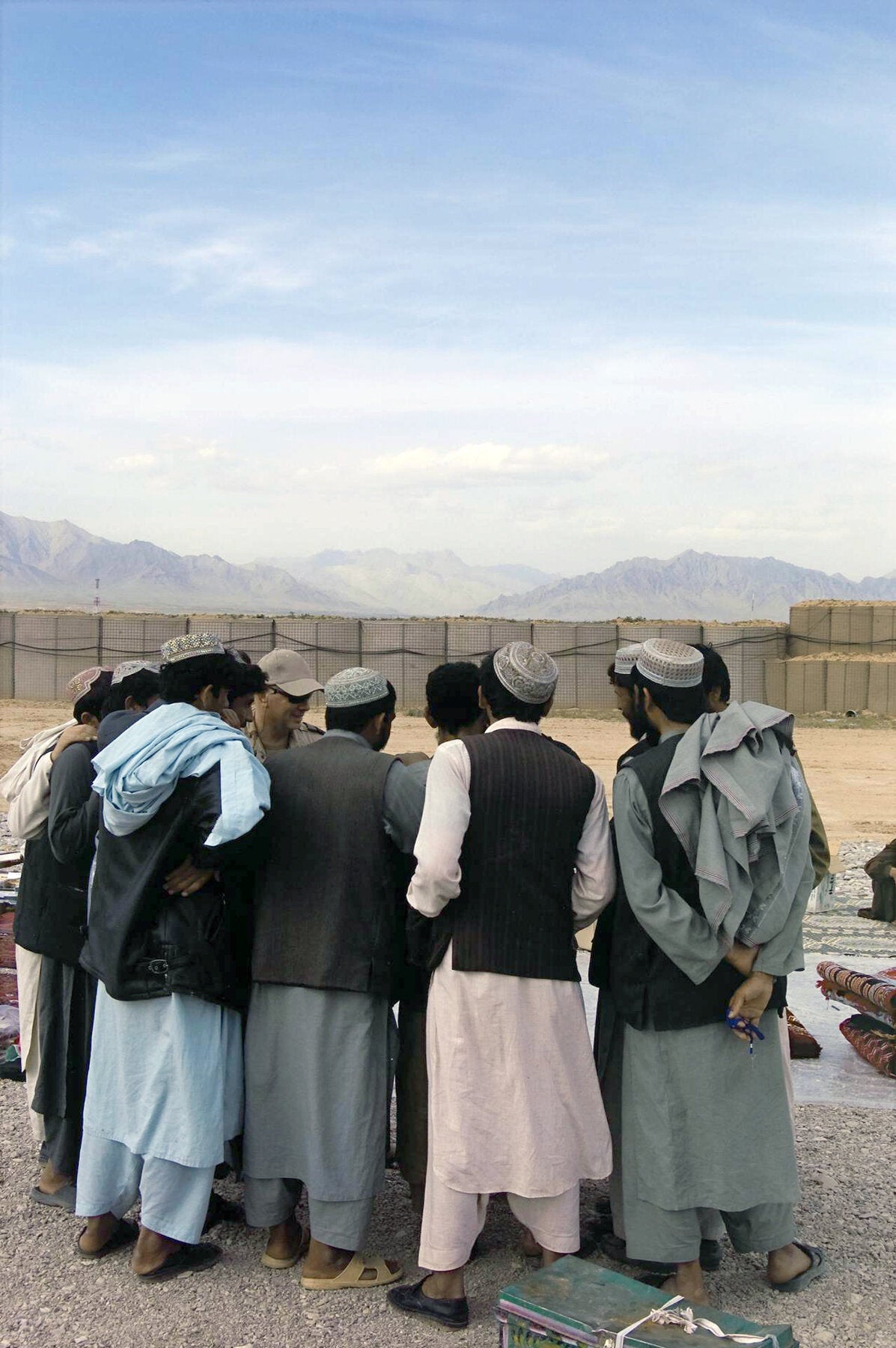
The Pull of Hunger, Pt. II

At the Teri Bridge, two green police trucks with Russian DShK machine guns choked the road. Toyota Hiluxs’, old orange Corollas, motorcycles, donkey carts, men with bundles of reeds strapped to their backs congealed along the span. The police were searching everyone. The Good American would be waiting for Toor Jan near the bazaar inside the city in an hour. If the line didn’t move fast, Toor Jan would miss his chance to fix the baby.
To ignore the heat and the wait, he imagined the pictures of the Taliban commanders on the SIM card hidden in his turban growing in weight, becoming so heavy that they forced his head down so that he could only look at his yellowed toenails peeking from the sandals. Then Toor Jan tried to imagine the sound his head might make hitting the ground after Talibs cut it off. A shudder broke over him. Toor Jan banished those thoughts and raised his eyes, away from the black possibilities.
Forty minutes passed before Toor Jan crossed the bridge. He hopped off and walked his motorcycle forward to a fat police officer. The police officer’s uniform buttons stressed around his belly. The constant rubbing of weight had worn the leather of his gun belt over time. Grease stains splotched down the front of his pants. He twisted one end of his moustache and watched. Toor Jan mopped his wet brow with the back of his hand.
“Stop,” the fat officer said. “Lay that motorcycle right there.”
He drew his pistol, scanning Toor Jan’s body. The crowd backed away, and other police officers took cover. The two trucks swung their machine gun barrels down. The fat officer came forward, with some bravery, and searched Toor Jan. He’d been trained by American police officers from New York City, and his palm invaded all of Toor Jan’s crevices. The fat officer found nothing. “Why are you sweating like that?”
“It’s hot.” Toor Jan shrugged.
“Tell me the truth, or I’ll kill you. Are you a bomber?”
“I’m not a bomber.” The police officer’s pistol remained pointed at him. Toor Jan’s body began to shake. “I swear by my eyes. I’m not a bomber.”
The fat officer made like he was squeezing the trigger. Toor Jan winced. He laughed and holstered his pistol. “We haven’t had a bomber in two years—” He spat into the dirt at the thought of bombers. “Because we have Mir Hamza Khan.”
The fat officer motioned through the haze of the city toward the horizon dominating billboard of General Mir Hamza Khan. General Khan’s blue Afghan National Police Uniform was clean and pressed, and he thrust his shoulders forward, emphasizing the red epaulets on each. He smiled, and the warm brown of his eyes flowed into the streets. His black hair thinned into a prominent widow’s peak. Underneath the picture, it read—BRIGADIER GENERAL HAJI MIR HAMZA KHAN: THE HERO OF PEACE AND UNITY.
Not only was Khan a general, but he was the Provincial police chief, mayor of the city, owner of every quarry in Uruzgan, and commander of his own militia. He lived in a white tile palace, the only one in the entire south of Afghanistan, and the people said he let his wife drive a cherry red Mercedes inside the walls of his compound. The Good American had called General Khan a criminal, but all Americans thought that of any Afghan who had learned to survive well. Toor Jan and General Khan were cousins, seeing each other on the Big Eid, but he feared him more than his uncle in the Taliban.
The police officer said, “there are rumors that bombers are coming. Have you heard of any?”
“No,” Toor Jan said. “I don’t know about things like that.”
“Go on then. There are Americans at the bazaar searching people too. Turn at the jail and go around them.”
“Thank you,” Toor Jan said. He jumped on his motorcycle and bore down to meet The Good American on time.
At the bazaar, Americans stood in the road with their helmets and guns, ready to fight. These Americans didn’t look like the others who’d been in Tarin Kowt before. They had beards and strange uniforms that didn’t match. The people said these ones could land a helicopter on the roof of your house and murder everyone in your compound before the dogs would even start barking. Toor Jan didn’t care about rumors. These Americans could land their helicopters on top of his head as long as they paid for information.
Toor Jan halted at an open vegetable stall twenty meters from the dismounted Americans. He leaned his motorcycle against a post and bought a kilo of dried blackberries. The toothless vendor was slow to fill the bag, and Toor Jan grew impatient as the precise time for meeting The Good American approached. He snatched the bag of berries, threw several thousand rupees across the counter, and walked quickly toward the idling American vehicles like The Good American had told him to do. Toor Jan prayed that they wouldn’t kill him—reduced to only pieces of meat for his family to wash before burial—as many others had just for approaching American vehicles.
Two Americans and the tajiman, Qais, saw him. The Americans pointed their weapons at him, and Qais said, “lift your shirt. Keep it up. That’s it. Turn around. All the way around. Okay. Stay there. Don’t move. Why are you in the city today?”
“I’m going to the bazaar to get food for my family,” Toor Jan said, repeating the code The Good American had taught him.
“You can’t leave your motorcycle there like that,” Qais said, finishing the code to tell Toor Jan they could meet.
The two Americans threw Toor Jan on the ground and zipped plastic handcuffs around his wrists like he’d been arrested. Qais took the bag of dried berries and even smacked the back of his head to make it convincing to anyone watching. They walked to a truck in the middle of the convoy.
“Get inside.”
The rear hatch unlocked with a hiss. The Good American sat on a canvas bench. He was a bald man with a bristly beard. His shoulders were large and robust, and his chest and great belly pressed against a loose gray button-down shirt. He wore sturdy work pants with untied boots. A machine pistol was in his lap. Toor Jan sat opposite and Qais on the floor between them, eating blackberries.
Toor Jan held his hand over his heart. “Hello, Commander. I have missed you.”
“I missed you too, Toor Jan.”
“I’m sorry I was almost late. I was stopped twice.”
“Who stopped you?”
“The police and some Talibs.”
“Why?”
“The Talibs wanted money, so I told them who my uncle was.”
The Good American laughed.
“The police were looking for bombers. I was nervous and sweating, so they thought I was a bomber.”
“Do you know anything about suicide bombers?”
“Nothing,” Toor Jan said. “But I’m sure my uncle has them hidden somewhere.”
“Where?”
“I don’t know. I will find out for you, Commander.”
The Good American rubbed his shaved head. Qais stood, stooping in the tight vehicle, and shook out his legs. He sat next to Toor Jan on the canvas bench, dropping the bag of blackberries between them. “We’ve had some trouble in the past.”
“Yes, we have, Commander.” During one of their meetings, Toor Jan had taken a secret picture of The Good American, but they caught him when he forgot to turn off the flash. Images of American spies were valuable to his Talib uncle but especially worth money to General Khan. No one had asked for a picture of The Good American, but if there was to be a future, Toor Jan needed that picture. He didn’t have loyalty to any of the three sides. His faith remained only in God and the risks that would bring food to his family. “But you beat me up pretty good, Commander. And destroyed my last cellphone,” he said, with bitterness that the translator heard. “I learned my lesson.”
The Good American took his hand. “I need to know who wanted that picture.”
Because he knew that the Americans had no chance of catching his uncle now, resting for the winter in Pakistan, Toor Jan lied, “that disgusting Talib who calls me his nephew.”
“Of course,” The Good American said, looking relieved. He pulled his cell phone from his pocket. “And he’ll still want that picture you tried to take? That’ll keep you out of trouble and able to come to the base and meet with me?”
“Yes.” Toor Jan said, going along. “But how, Commander?”
“Like this,” he said and turned his cell phone toward Toor Jan. A thin man with blond, curly hair and a sharp nose stared ahead. “I’ll send this picture to your phone, and you give this to your uncle. Tell him it’s me.”
“But it’s not you.”
“I know. Just say it is.”
Toor Jan was intrigued. “Who is it?”
“A friend of mine. But from now on, it’s me.” The Good American leaned forward. “You left your phone at home like I told you?”
Toor Jan pressed his heel into his cell phone in his shoe. “Yes, Commander.”
“Perfect,” The Good American said. He seemed to relax even more. “I’ll Bluetooth this picture to you. You’ll see it when you get home.” The Good American put his cell phone away. “I have a new plan for you, andiwale.”
Toor Jan nodded.
“We need to find the people who give your uncle weapons. Your uncle’s men can’t attack without weapons.”
“This is a good idea, Commander.”
“You remember Haji Hyatullah?” He pointed out the porthole at Toor Jan’s red Chinese motorcycle still leaned against the pole near the vegetable stall. Haji Hyatullah was an aged man, covered in dangling skin tags, that sold motorcycles in the northern part of the bazaar. To get around for his spying missions, The Good American had given Toor Jan money to buy the cheap motorcycle from Haji Hyatullah.
“How could I forget? You changed my life with that motorcycle.”
“What do you know about Haji Hyatullah?”
“That he’s General Khan’s man.”
The Good American straightened. “How?”
“The General calls Haji Hyatullah his uncle.”
“So they’re related?” The Good American looked at Qais. “Right?”
“No, Haji Hyatullah is very important to the General. So the General calls Haji Hyatullah uncle.”
“Because they sell weapons together?”
Toor Jan smiled inwardly at The Good American’s assumption. He always assumed. It made getting paid for information easy. “Yes.”
“How do you know this, Toor Jan?”
“Everyone knows.” Haji Hyatullah selling the weapons that General Khan’s police seized on operations back to the Talibs was just another rumor, but, unlike Toor Jan, The Good American loved rumors. “Go and ask anyone.”
The Good American looked at his watch. “We have to go. Can you meet me next Tuesday at eleven-thirty? At the base?”
“Wo,” Toor Jan said. He smiled. “I had my son, Commander.”
“Congratulations,” The Good American said without a smile.
Toor Jan flattened. He risked everything for The Good American and felt like his friend. Friends should be joyful at hearing good news. “We need a doctor for him.”
“Go to the Chinese hospital.” The people said that a man who went to the Chinese hospital complaining of elbow pain would leave with an amputated arm. More rumors except Toor Jan had once met a man who’d been reduced to living in a field after going blind there. It wasn’t a good place. The Good American added, “they’ll take you for free.”
“My son’s lip is torn in the middle,” Toor Jan said. “Only your doctors can fix that.”
The Good American stared at Toor Jan. “You took a picture of me, for God knows what. Find out more about Haji Hyatullah, and there’ll be more trust.”
“What do you need to know, Commander?”
The Good American inhaled sharply, annoyed. “What does he look like?”
“He has many skin tags.”
“No, Toor Jan, I need more.”
Toor Jan smiled. “Like a picture?”
“Yes,” The Good American said. “We all know you can take a picture.”
Toor Jan’s smile fell. He looked at the floor to hide his rage. He’d rather know how to construct buildings or sing poems, but that wasn’t the life God had made for him. Taking pictures fed his family; taking risks kept them healthy.
“You get a picture of Haji Hyatullah, and I’ll get you a doctor for your son.”
“I will,” Toor Jan said, without knowing how. He pushed open the rear hatch and crouched to jump out when someone grabbed him from behind.
“Your blackberries,” The Good American said, motioning to the limp bag on the seat.
“Yours,” Toor Jan said. The right thing to do even though he was starved. “With my compliments.”
“Thanks, Toor Jan. Now go do work.”
Written By Matt Cricchio
9/20/21









